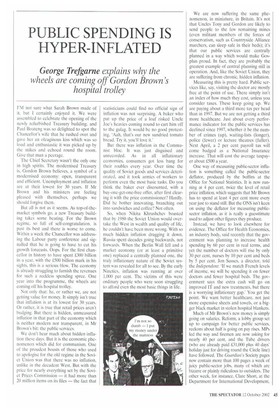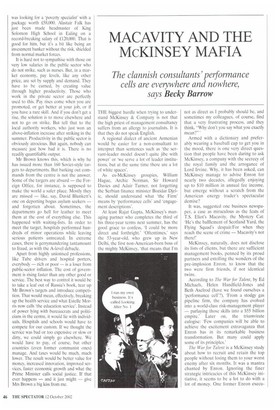PUBLIC SPENDING IS HYPER-INFLATED
George Trefgarne explains why the wheels are coming off Gordon Brown's hospital trolley
I'M not sure what Sarah Brown made of it, but I certainly enjoyed it. We were assembled to celebrate the opening of the newly refurbished Treasury building, and Paul Boateng was so delighted to spot the Chancellor's wife that he rushed over and gave her an oleaginous kiss which was so loud and enthusiastic it was picked up by the mikes and echoed round the room. Give that man a peerage.
The Chief Secretary wasn't the only one in high spirits. The modernised Treasury is, Gordon Brown believes, a symbol of a modernised economy: open, transparent and efficient. Unemployment and inflation are at their lowest for 30 years. If Mr Brown and his ministers are feeling pleased with themselves, perhaps we should forgive them.
But all is not as it seems. As top-of-themarket symbols go, a new Treasury building takes some beating. For the Brown regime, so full of self-congratulation, is past its best and there is worse to come. Within a week the Chancellor was addressing the Labour party conference and signalled that he is going to have to cut his growth forecasts. Oops. For the first chancellor in history to have spent £300 billion in a year, with the £500 billion mark in his sights, this is a serious blow. The economy is already struggling to furnish the revenues for such a reckless spending spree. One year into the programme, the wheels are coming off his hospital trolley.
Not only that: he, or rather we, are not getting value for money. It simply isn't true that inflation is at its lowest for 30 years. Or rather, it is true that retail prices aren't budging. But there is hidden, unmeasured inflation in that part of the economy which is neither modern nor transparent, in Mr Brown's bit: the public services.
We don't hear much about hidden inflation these days. But it is the economic phenomenon which did for communism. One of the proudest boasts of those who used to apologise for the old regime in the Soviet Union was that there was no inflation, unlike in the decadent West. But with the price for nearly everything set by the Soviet Prices Commission — it had more than 20 million items on its files — the fact that
statisticians could find no official sign of inflation was not surprising. A baker who put up the price of a loaf risked Uncle Joe's heavies coming round to cart him off to the gulag. It would be no good protesting, `Aah, that's our new sundried tomato bread. Try it, you'll love it.'
But there was inflation in the Communist bloc. It was just disguised and unrecorded. As in all inflationary economies, consumers got less bang for their roubles every year. Over time the quality of Soviet goods and services deteriorated, and it took armies of workers to perform even the most basic tasks. Do you think the baker ever discounted, with a buy-one-get-one-free offer, after first clearing it with the price commissioner? Hardly. Did he bother innovating, branching out into sandwiches and coffee? Not often.
So, when Nikita Khrushchev boasted that by 1980 the Soviet Union would overtake the West in wealth and quality of life, he couldn't have been more wrong. With so much hidden inflation dragging it down, Russia spent decades going backwards, not forwards. When the Berlin Wall fell and a market economy (or at least a primitive one) replaced a centrally planned one, the truly inflationary nature of the Soviet system was revealed for all to see. By the early Nineties, inflation was running at over 1.000 per cent. The victims of this were ordinary people who were soon struggling to afford even the most basic things in life. We are now suffering the same phenomenon, in miniature, in Britain. It's not that Uncles Tony and Gordon are likely to send people to the few remaining mines (even militant members of the forces of conservatism, such as Countryside Alliance marchers, can sleep safe in their beds); it's that our public services are centrally planned in a way which would make Gosplan proud. In fact, they are probably the greatest example of central planning still in operation. And, like the Soviet Union, they are suffering from chronic, hidden inflation.
Measuring this is pretty hard. Public services like, say, visiting the doctor are mostly free at the point of use. There simply isn't an index of how much they cost, unless you consider taxes. These keep going up. We are paying about a third more tax per head than in 1997. But we are not getting a third more healthcare. Just about every performance indicator for the public services has declined since 1997, whether it be the number of crimes (up), waiting-lists (longer), police (fewer) or lecture theatres (fuller). Next April, a 2 per cent payroll tax will come badged as a National Insurance increase. That will cost the average taxpayer about £500 a year.
One way of measuring public-sector inflation is something called the public-sector deflator, produced by the boffins at the Office for National Statistics. It is now running at 4 per cent, twice the level of retail price inflation, which suggests that Mr Brown has to spend at least 4 per cent more every year just to stand still. But the ONS isn't keen on using the deflator for measuring publicsector inflation, as it is really a guesstimate used to adjust other figures they produce.
Instead, we have to look elsewhere for evidence. The Office for Health Economics, an industry body, said recently that the government was planning to increase health spending by 60 per cent in real terms, and yet the number of doctors will rise by only 30 per cent, nurses by 10 per cent and beds by 5 per cent. Jon Sussex, a director, told the Independent: 'If we match French levels of income, we will be spending it on fewer doctors and fewer hospital beds. The government says the extra cash will go on improved IT and new treatments, but there is a worrying inflationary gap. You get the point. We want better healthcare, not just more expensive sheets and towels, or a bigger black market in stolen hospital blankets.
Much of Mr Brown's new money is simply going on salaries. Reform, a lobby group set up to campaign for better public services, reckons about half is going on pay rises. MPs led the way and firemen are now asking for nearly 40 per cent, and the Tube drivers (who are already paid £31,000 plus 40 days' holiday just for driving round the Circle line) have followed. The Guardian's Society pages now contain more than 100 pages a week of juicy public-sector jobs, many of which are bizarre or plainly ridiculous to outsiders. The other week, for instance, Clare Short, at the Department for International Development, was looking for a 'poverty specialist with a package worth £58,000. Alastair Falk has just been made headmaster of King Solomon High School in Ealing on a record-breaking salary of £120,000. That is good for him, but it's a bit like being an investment banker without the risk, shielded from normal market forces.
It is hard not to sympathise with those on very low salaries in the public sector who do not strike, such as nurses. But, in a market economy, pay levels, like any other price, are set by supply and demand. They have to be earned, by creating value through higher productivity. Those who work in the private sector are perfectly used to this. Pay rises come when you are promoted, or get better at your job, or if you have a rare skill. And if you don't get a rise, the solution is to move elsewhere and not to go on strike. But tell that to the local authority workers, who just won an above-inflation increase after striking in the summer. Productivity in the public sector is obviously atrocious. But again, nobody can measure just how bad it is. There is no readily quantifiable output.
Mr Brown knows this, which is why he has issued more than 160 Soviet-style targets to departments. But barking out commands from the centre is not the answer. Some of the targets are absurd — the Foreign Office, for instance, is supposed to make the world a safer place. Mostly they are missed — like, say, David Blunkett's one on deporting bogus asylum seekers — and forgotten about. Sometimes, the departments go hell for leather to meet them at the cost of everything else. This happened with waiting-lists. In order to meet the target, hospitals performed hundreds of minor operations while leaving serious patients untreated. In extreme cases, there is gerrymandering tantamount to fraud, as with the A-level debacle.
Apart from highly unionised professions, like Tube drivers and hospital porters, everybody — rich or poor — is a loser from public-sector inflation. The cost of government is rising faster than any other good or service. The best way to control it would be to take a leaf out of Russia's book, tear up Mr Brown's targets and introduce competition. That would mean, effectively, breaking up the health service and what Estelle Morris now calls the education service'. Instead of power lying with bureaucrats and politicians in the centre, it would lie with individuals. Hospitals and schools would have to compete for our custom. If we thought the service was bad or too expensive or slow or dirty, we could simply go elsewhere. We would have to pay, of course, but other countries (even former communist ones) manage. And taxes would be much, much lower. The result would be better value for money, increased innovation, improved services, faster economic growth and what the Prime Minister calls social justice. If that ever happens — and it just might — give Mrs Brown a big kiss from me.



































































































 Previous page
Previous page